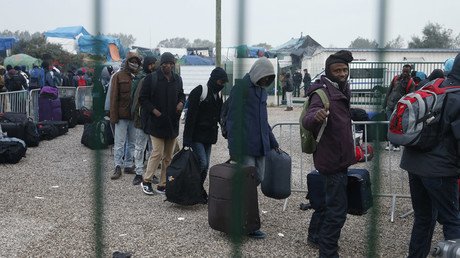Boris Johnson’s cash pledge for Libyan coastguard will ‘push migrants into traffickers’ hands’ – MSF
Foreign Secretary Boris Johnson has pledged to give Libya £9 million (US$11.5 million) to help stem the flow of migrants to Europe. He has provoked a widespread backlash from NGOs, however, which claim the policy traps refugees in a war zone.
Speaking on a trip to Libya’s capital, Tripoli, Johnson said the UK would support the Libyan Government of National Accord (GNA) to “reduce the number of illegal migrants heading for Europe.”
Libya has been in crisis ever since the UK-backed ousting of Colonel Muammar Gaddafi in 2011, which left the country divided between two opposing factions.
“Libya is the front line for many challenges which, left unchecked, can pose problems for us in the UK – particularly illegal migration and the threat from terrorism,” the foreign secretary said.
“That’s why it is so important that we work with the Libyan government and our partners to help bring stability to Libya, stopping it from becoming a fertile ground for terrorists, gun runners and people traffickers in close proximity to Europe.”
Besides supporting Libya in an unspecified “political process,” Johnson also pledged to help on a practical level, by ensuring that the Libyan coastguard can “secure their own borders, reducing the number of illegal migrants heading for Europe.”
NGOs argue the foreign secretary’s pledge will trap refugees in a conflict-ridden region and fail to stop their suffering.
Andre Heller-Perache, UK head of programs for Médecins Sans Frontières (MSF), said the policy is counterproductive.
“What Boris Johnson notably fails to mention is the multiple occasions – as recent as last week – on which the UK-trained Libyan coastguard has threatened, or even fired upon, NGO search and rescue vessels operating in international waters,” he said, according to the Guardian.
“This shows that the British government is happy to sweep the appalling human cost of its deterrence policies on migration under the carpet – anything to make this someone else’s problem.”
According to the UN, refugees in Libya risk rape, torture and exploitation at the hands of smugglers, meaning that sending them back to the country from international waters would violate international law.
“[The UK] policy is pushing refugees and migrants into the hands of criminals and people traffickers, contributing to the very problem the government claims to want to solve,” Heller-Perache added.
“The foreign secretary can no longer remain silent on this issue – he has serious questions to answer on the harm caused by Britain’s support for the Libyan coastguard, and the role that it plays trapping people in Libya.”














